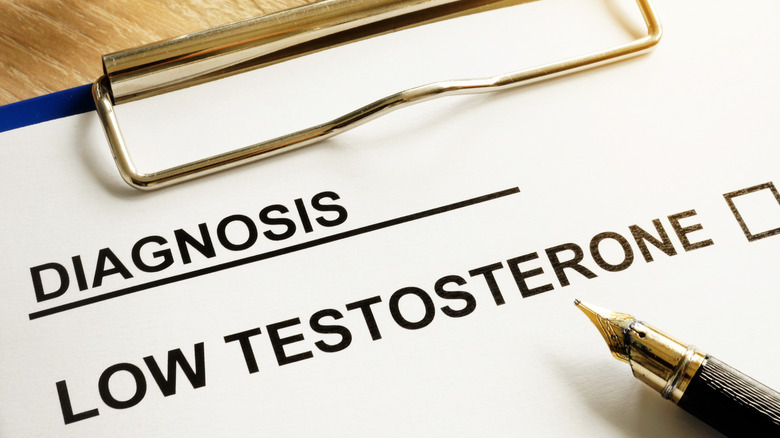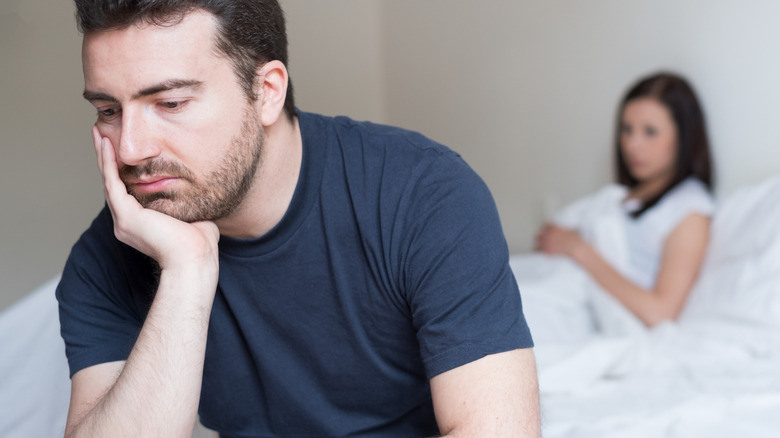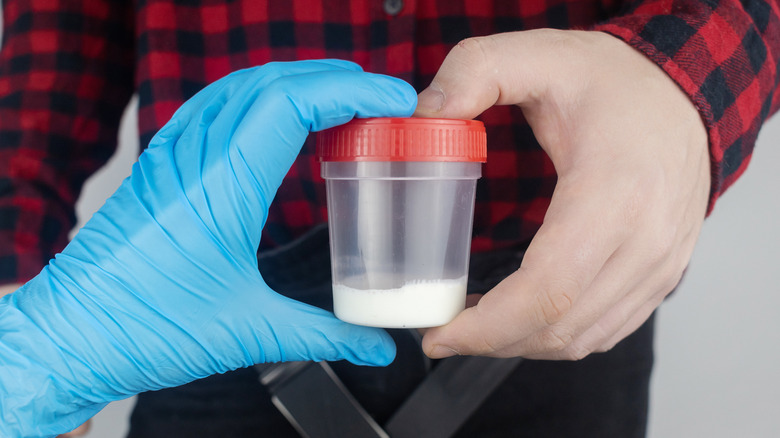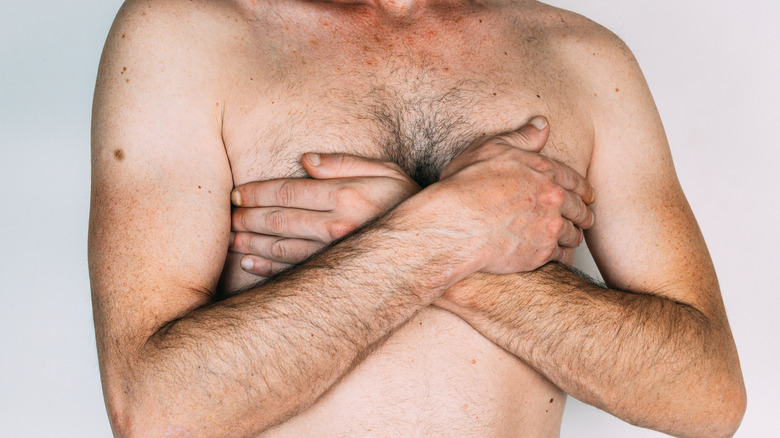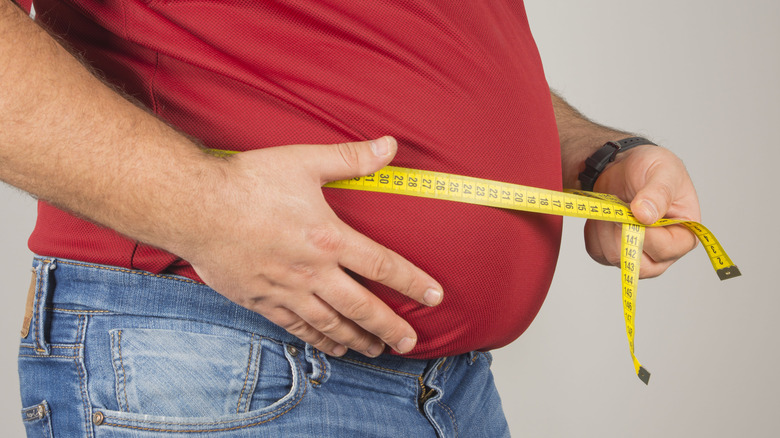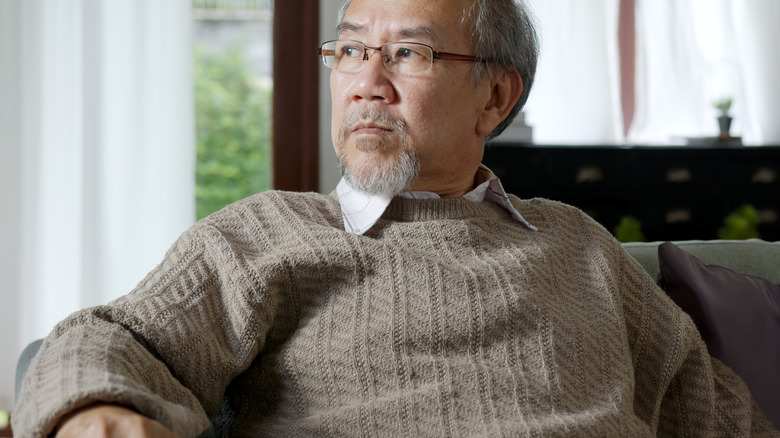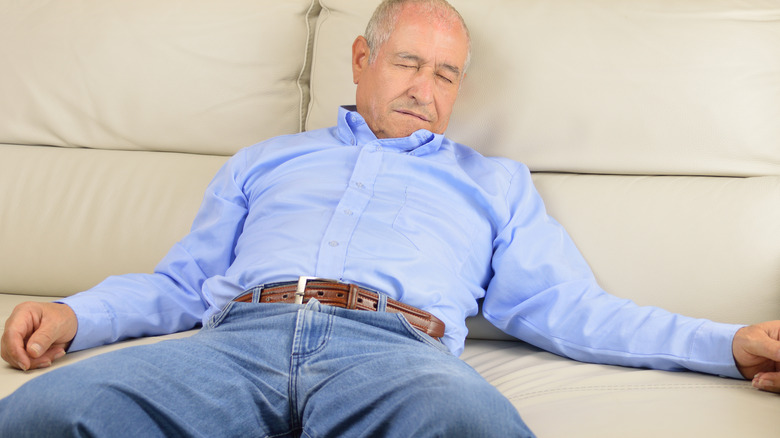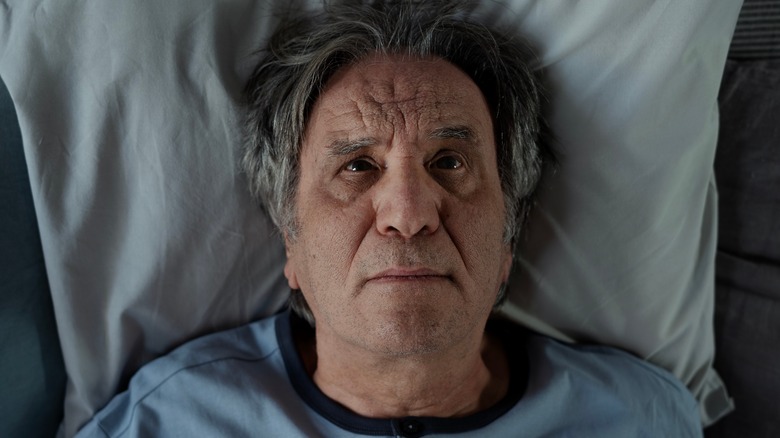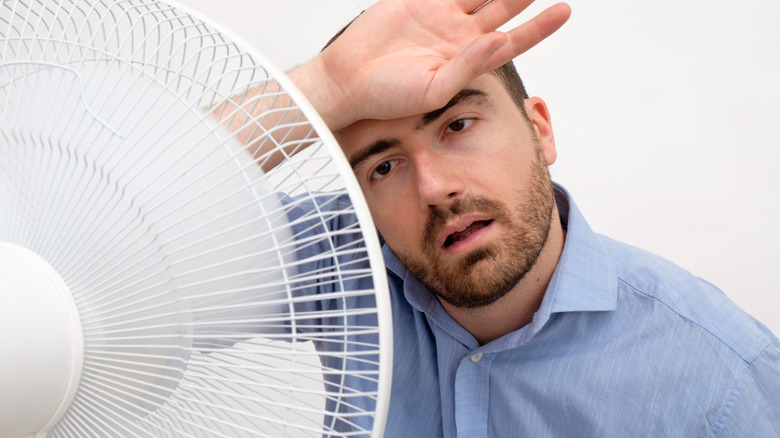Warning Signs That You May Have Low Testosterone
Produced in the testes, testosterone is a male sex hormone that plays a significant role in the development of pubic, armpit, and facial hair, sex drive, sperm production, and maintaining muscle mass and bone density (via Endocrine Web).
Testosterone levels vary between men, but normally fall between 300 and 1000 nanograms per deciliter of blood. This value fluctuates throughout the day. However, some men — including roughly 1% of young men and about half of men over 80 years of age — have lower-than-normal levels. Men with low testosterone levels may experience signs of the condition. Some of the early signs include a reduced sex drive and breast enlargement. Over time, low testosterone might cause loss of body hair, muscle wasting, shrinkage of the testes, and an increased risk of osteoporosis.
Available treatments for low testosterone include testosterone supplements and testosterone replacement therapy (via Medical News Today). However, these treatments are usually administered with caution, and only used where absolutely necessary. There are health risks and side effects of these treatments which could outweigh the benefit of getting treated. In addition, there are also natural ways to increase your testosterone levels.
What does it mean to have low testosterone?
Low testosterone (also known as low-T, male hypogonadism, or testosterone deficiency syndrome) is defined, clinically, as a man having below 300 nanograms of testosterone per deciliter of blood (via Urology Care Foundation). Low testosterone is usually accompanied by symptoms such as low sex drive, erectile dysfunction, loss of body hair, low energy levels, poor focus, or poor memory.
A paper published in the International Journal of Clinical Practice notes that some men have low testosterone levels, but show no signs of the condition. However, this isn't necessarily a problem, provided your testosterone levels still meet the body's demands. Moreover, you can't instantly tell that you have low testosterone just from these signs, as they could point to other conditions. Therefore, a diagnosis requires both low-T levels and symptoms associated with reduced testosterone levels (per Urology Care Foundation).
A further step in the diagnosis of low testosterone is finding its cause, as addressing it can improve testosterone levels. Production of testosterone by the testes could be affected by trauma, birth defects, or chemotherapy. Additionally, conditions like congenital disorders, type 2 diabetes, obesity, obstructive sleep apnea, or alcohol abuse could affect hormones that regulate testosterone production, via an article in the Cleveland Clinic Journal of Medicine.
Your testosterone levels will decline as you grow older
Testosterone levels gradually decline in all men as they get older. Per a review published in Psychosomatics, the decline can be "as much as 40% between the ages of 40 and 70 years." Up to 20% of men above 60 years don't meet the cutoff for normal testosterone levels because of this decline. With that said, what's considered as "normal" still needs to be defined for older adults.
Moreover, a systematic review in the Canadian Medical Association Journal notes that this decline might not be a problem requiring medical treatment. Many older men show no signs of low testosterone, and most of the symptoms that older men develop tend to be non-specific. They could be caused by conditions common to older men, such as diabetes or cardiovascular diseases.
Low testosterone in older adults is caused by gradual damage and decrease in the number, activity, and sensitivity of Leydig cells, which are responsible for producing testosterone within the testes (via a review published in the International Journal of Molecular Sciences). Low testosterone is also associated with the reduction in sperm production in older men.
Your sex drive is low
Your sex drive or libido describes how interested you are in sexual activities (via MSD Manuals). Having a low sex drive doesn't mean you're unable to have sex or perform other sexual activities, but you may engage in them less frequently, and have fewer sexual fantasies or thoughts. You may also lack interest in things you hear, see, or feel that should be sexually stimulating.
It's hard to state what's normal when it comes to sex drive because men don't all have the same sex drives. Additionally, men may experience moments of high or low libido depending on stress, sleep, or opportunities for sex. It's also expected that your sex drive will be lower than what it was when you were between 13 and 29 years of age (via WebMD).
However, if your sex drive is unusually low and has been this way for a while, it may be caused by low testosterone. Your testosterone levels influence your interest in sex, and low libido can be a sign of a sharp drop in testosterone levels. With that said, certain medications or chronic illnesses like depression, or restless leg syndrome might actually be the culprit, and not low testosterone levels (via Healthline). Furthermore, as WebMD notes, it's possible to have low testosterone levels while still maintaining one's sex drive.
You have fewer erections
Apart from affecting your desire to have sex, low testosterone may make you have fewer spontaneous erections such as morning erections (per Healthline). It may also affect your ability to become and stay erect, which is known as erectile dysfunction. Testosterone stimulates the release of neurotransmitters like dopamine and oxytocin (which help you get an erection), as well as your spinal nerves (which affect blood flow to the penis during an erection).
However, low testosterone is not a major cause of erectile dysfunction. It might only directly cause erectile dysfunction when your testosterone levels are extremely low, says the Low-T Center. Erectile dysfunction has a lot more to do with blood flow to your penis than your hormones. The major cause of erectile dysfunction is atherosclerosis, which is the hardening and narrowing of the arteries. Other cardiovascular problems, as well as relationship and mental health problems, can cause erectile dysfunction.
The relationship between low testosterone and erectile dysfunction can't be dismissed completely, though. Although low-T might not directly cause erectile dysfunction, its complications can make it hard to get an erection. Moreover, low testosterone and erectile dysfunction often occur together along with the same comorbid conditions, making it hard to separate the two.
You've noticed a decrease in ejaculate volume
The quantity of semen you produce after an orgasm is your ejaculate volume (via Hims). You might not know how much ejaculate you produce unless you measure it, but it's between 1.5 and 4.5 milliliters per ejaculation in most men. Unsurprisingly, low testosterone is a common cause of a smaller ejaculate volume.
Your ejaculate volume isn't always constant, and may drop if you have sex often or as you age (via Everyday Health). But if there's a significant drop in the volume of your ejaculate, then low testosterone could be the culprit. Testosterone is important for the functioning of the prostate gland and seminal vesicles. These glands are responsible for the production of semen. Thus, a low testosterone level can reduce the volume of semen produced by these glands.
Another possible cause of low ejaculate volume is retrograde ejaculation, in which part of the ejaculate goes up through the urethra to the bladder and comes out with urine. An obstruction of the genital tract is another possible cause (per Hims). Everyday Health adds that a small ejaculate volume can be caused by certain antibiotics or antidepressants one might be taking.
You're developing male breasts
Male breasts, known medically as gynecomastia, is an increase in the breast tissue of a man (via the Cleveland Clinic). It affects up to 65% of males worldwide, and can be observed in newborn males, boys in puberty, and older men.
Gynecomastia is different from pseudogynecomastia, or the deposition of fat in the breast of obese men. Male breasts are caused by an imbalance between testosterone and estrogen in the male body. Men normally have small quantities of estrogen, but male breasts develop when estrogen is in excess of testosterone or testosterone levels are low. Gynecomastia may appear as a small breast lump or an enlarged breast. It may affect only one breast or grow to different sizes in both breasts.
Per the Mayo Clinic, gynecomastia isn't a serious problem, although some men feel self-conscious about it. Additionally, some men with this condition don't report experiencing any symptoms. However, you should visit your doctor if you experience pain, swelling, tenderness, or nipple discharge. Apart from low testosterone, gynecomastia could be caused by thyroid, kidney, or liver problems, cancer, or tumors in the adrenal or pituitary gland. It might also be a side effect of medication (via Johns Hopkins Medicine).
You've gained weight that you just can't lose
According to a review published in the Asian Journal of Andrology, low testosterone encourages an increase in fat deposition, especially belly fat. Extreme reduction in testosterone, as seen during androgen deprivation therapy for prostate cancer, is associated with a sudden increase in weight.
The gradual reduction in testosterone in men is also associated with weight gain, but this happens a bit more slowly. Low testosterone reduces muscle mass, which makes it hard to be physically active and lose weight (per Vitality Aesthetic and Regenerative Medicine). It also doesn't help that low testosterone reduces the motivation to exercise.
Low testosterone and weight gain have a two-way relationship. Low testosterone is a common finding in obese or overweight men, and significant weight loss increases testosterone levels. Testosterone is converted to estrogen in fat cells by the enzyme aromatase. Thus, more fat means more estrogen will be produced. Estrogen, in turn, inhibits the production of testosterone. Low testosterone levels further worsens weight gain, creating a vicious cycle.
You're experiencing mood changes
Mood changes are not particular symptoms of low testosterone, but they shouldn't be overlooked — especially if you are experiencing more specific signs as well.
Testosterone plays significant roles in regulating your psychological states, which includes your positive or negative moods (via a review published in Andrology). It regulates your behavior, influencing how you respond to situations and interact with others. Testosterone also impacts your quality of life, especially since sexual function is an important aspect of life.
Depression is associated with low testosterone, with men showing signs of dysthymia (minor depression), listlessness, fatigue, emotional inertia (being indifferent, unmotivated), and even major depression. Depression caused by low testosterone affects sexual abilities, and a dampened sexual ability contributes to depression in men with low-T. Additionally, testosterone helps men reduce anxiety by helping them cope with stress and reducing fear. Thus, men with low testosterone also tend to develop signs of unfocused anxiety or phobias.
Another mood change experienced by men with low testosterone is increased irritability, per Healthline. This, accompanied by other mood changes and other signs of low testosterone, results in irritable male syndrome in older men. A man exhibiting the signs of low testosterone could be stereotyped as a "grumpy old man."
You keep feeling weak and tired
Many men who have low testosterone levels struggle with fatigue — and this doesn't come from the occasional overexertion.
Men with low testosterone may feel weak and tired, even after they've rested or slept (via A.Vogel). They don't feel motivated to perform physical activities because of this fatigue. Healthline adds that low libido, increased weight, lack of motivation, and trouble sleeping — all from low testosterone — contribute to fatigue associated with the condition. This form of fatigue is characterized by periods of low energy which last for a long time.
Low testosterone also reduces muscle mass and bone density, which contributes to the person feeling weak. Testosterone helps men maintain muscle bulk, and when it's low, muscles begin to waste away, explains Dr. Ronald Tamler, a professor of medicine, endocrinology, diabetes, and bone disease (via Everyday Health). A person with low testosterone won't immediately experience muscle wasting, as this happens after some time.
Low testosterone may also reduce bone density, which makes men more frail and prone to bone fractures (via Healthline). Reductions in bone density from low testosterone is the leading cause of osteoporosis in men. Osteoporosis is the result of the body breaking down bone faster than it builds up new bone.
You have trouble sleeping
Low testosterone levels also play a part in worsening the sleep quality of older men. Research published in the Journal of Clinical Endocrinology & Metabolism found that low testosterone affects the ability of older men to stay asleep, but doesn't affect sleep duration. Low testosterone was associated with waking up frequently at night, spending more time awake while in bed, and spending less time in slow wave sleep, the deepest stage of sleep.
Good quality and sufficient sleep is necessary for testosterone production. Per a review in the Asian Journal of Andrology, testosterone levels increase when men start sleeping, reach their highest level about three hours into uninterrupted sleep, and remain high till waking. It's this way even for night shift workers who sleep during the day. However, testosterone doesn't increase as much as it should when sleep is interrupted in older men.
Another hormone that contributes to the sleep difficulties of older men is the stress hormone cortisol, which keeps one awake and prevents deep sleep (via a review published in Sleep). There could be a connection between low testosterone and high cortisol levels in worsening sleep quality, because testosterone has been found to inhibit cortisol production. Normally, cortisol levels are lowest at night, and high testosterone levels during sleep could play a role in lowering cortisol. Additionally, in older men, testosterone levels decrease, while cortisol levels increase. With that said, more evidence is needed to prove their relationship and how they cause sleep problems.
You experience night sweats or hot flashes
Hot flashes involve sudden warmth and redness of the skin, followed by profuse sweating (via Harvard Health Publishing). The head and trunk get the most heat during an episode. This is a familiar experience for many postmenopausal women, especially in the first year. But men could get hot flashes, too — and reduced sex hormone levels are the culprit in such cases.
Hot flashes are common among women because estrogen levels dip after menopause. The decline of testosterone is gradual for men, and almost all men maintain adequate testosterone levels to never experience a hot flash. However, a majority of men who receive androgen replacement therapy for prostate cancer experience hot flashes, because testosterone levels plummet with this treatment.
A good number of older adults sweat profusely at night, such that they wake up with their clothes and sheets drenched in sweat; this is known as night sweats (via Medical News Today). Low testosterone levels could be responsible for this. It could also be a side effect of medications or caused by chronic health conditions.
Low testosterone affects children and teens, too
Having low testosterone levels is not just a problem for middle-aged and older men. It also causes hypogonadism in boys (via MSD Manuals). Low testosterone in boys might not manifest as low sex drive or erectile dysfunction, but the signs depend on when hypogonadism develops.
Testosterone is important during puberty. Low testosterone levels at this time cause "abnormally long" extremities and enlarged breasts, and can affect the development of male secondary sexual characteristics. Testosterone also plays a big role in developing the male genitals in the womb. Low testosterone levels may cause undescended testes (cryptorchidism), small penis, or atypical (intersex) genitalia. These developments depend on when low testosterone develops during pregnancy.
Hypogonadism in boys is caused by conditions that affect the testes, pituitary gland, or hypothalamus (via a review published in Frontiers in Endocrinology). It could be a genetic, congenital, or acquired problem. These include Klinefelter syndrome, Kallman syndrome, Prader-Willi syndrome, infections or trauma to the testis, obesity, type 2 diabetes, use of illicit drugs, anabolic steroid use, tobacco smoking, or exposure to environmental toxins.
Is low testosterone a problem for women?
You may have heard that testosterone is the "male" hormone, while estrogen is the "female" hormone. Actually, both hormones are present in all sexes, but produced in different amounts (via Endocrine Web). Males produce small amounts of estrogen, and women produce small amounts of testosterone. Testosterone in women is produced by the ovaries and the adrenal glands. It is involved in bone growth, bone strength, sexual drive, health of the ovaries, and energy levels in women.
Women produce 10 to 20 times less testosterone than men, with values between 15 and 70 nanograms per deciliter of blood. While this might seem small, it's possible for women to experience effects of abnormal testosterone levels. For example, high testosterone levels can lead to excessive hair and acne growth or polycystic ovarian syndrome (PCOS). Meanwhile, low testosterone in women can cause vaginal dryness, low libido, fertility problems, irregular periods, and breast changes, and may even contribute to osteoporosis.
Women don't really need to treat low testosterone levels from age-related decline. Treatment might be necessary if low testosterone is caused by removal of the ovaries or a health condition. Some women seek testosterone therapy for low libido. However, side effects like developing masculine features (which some women may not desire) and other health risks outweigh the benefits of this treatment. Moreover, low testosterone may not be the cause of a woman's low libido; plus, other treatments are available (via Healthline).


